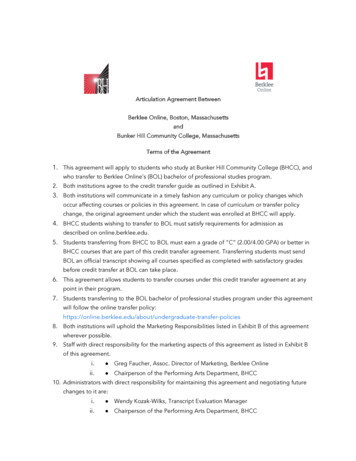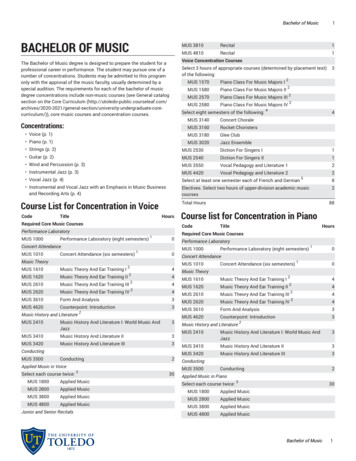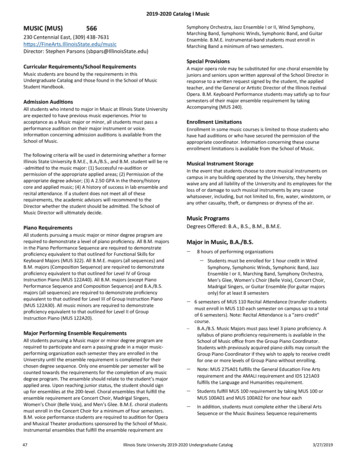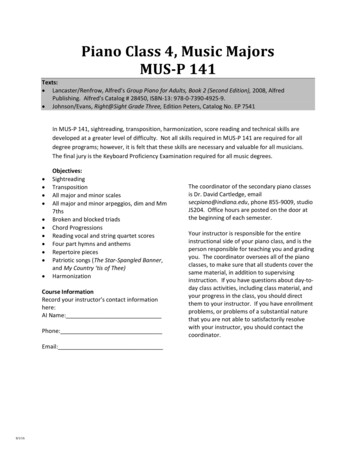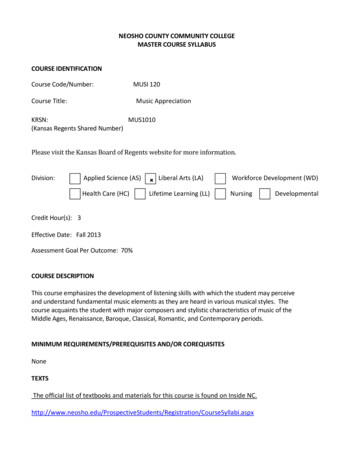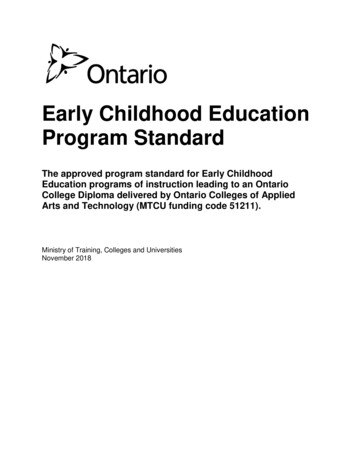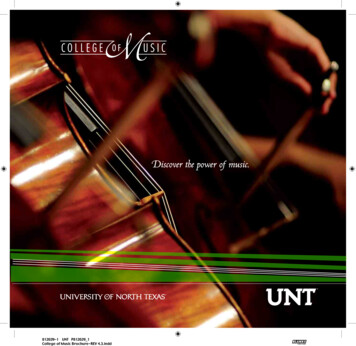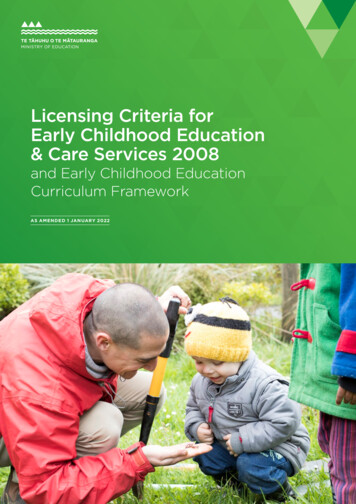
Transcription
Communication and Creative & Performing Arts Division1400 Tanyard Road, Sewell, NJ 08080856-468-5000MUS 103: Music in Childhood EducationSyllabusLecture Hours/Credits: 3/3Catalog DescriptionPrerequisite: RDG099 or ENG 104This course focuses on music as an integral component of teaching and learning in the world ofearly childhood and in the elementary school curriculum. Students interested in working withchildren at the preschool or primary level will explore a variety of musical styles to develop theirown critical aesthetic and artistic vocabulary. Students learn how to help children utilize music inthe exploration and expression of thoughts and feelings. The early childhood portion of thecourse builds an understanding of musical development, with emphasis placed on music andmovement. Elementary methods include design, construction, implementation, and assessmentof classroom music activities that integrate the arts with elementary classroom curricula.Textbook and Course MaterialsIt is the responsibility of the student to confirm with the bookstore and/or their instructor thetextbook, handbook, and any other materials required for their specific course and section.Click here to see current textbook prices at rcgc.bncollege.com.Evaluation AssessmentOnline ProctoringAll courses offered at RCSJ, whether they are web-enhanced, hybrid, or fully online, mayinclude assessments that make use of Online Proctoring. To find out more about OnlineProctoring, and to learn about the minimum technical requirements, visitrcsj.edu/elearning/online-proctoring.Grading DistributionGrading to be determined by individual instructors.Individual instructors may include the following assessment(s): ExamsQuizzesListening AssignmentsWritten AssignmentsProjects
In-Class Music-Making LabsClass ContributionGradingThe grading scale for each course and section will be determined by the instructor anddistributed the first day of class.Rowan College South Jersey Core Competencies(Based on the NJCCC General Education Foundation - August 15, 2007; Revised 2011; Adopted 2014)This comprehensive list reflects the core competencies that are essential for all RCGCgraduates; however, each program varies regarding competencies required for a specificdegree. Critical thinking is embedded in all courses, while teamwork and personal skills areembedded in many courses.1. Written and Oral Communication: Students will communicate effectively in bothspeech and writing.2. Quantitative Knowledge and Skills: Students will use appropriate mathematical andstatistical concepts and operations to interpret data and to solve problems3. Scientific Knowledge and Reasoning: Students will use the scientific method ofinquiry, through the acquisition of scientific knowledge.4. Technological Competency: Students will use computer systems or other appropriateforms of technology to achieve educational and personal goals5. Society and Human Behavior: Students will use social science theories and conceptsto analyze human behavior and social and political institutions and to act as responsiblecitizens.6. Humanistic Perspective: Students will analyze works in the fields of art, history, music,or theater; literature; philosophy and/or religious studies; and/or will gain competence inthe use of a foreign language7. Historical Perspective: Students will understand historical events and movements inWorld, Western, non-Western or American societies and assess their subsequentsignificance.8. Global and Cultural Awareness: Students will understand the importance of a globalperspective and culturally diverse peoples.9. Ethical Reasoning and Action: Students will understand ethical issues and situations.10. Information Literacy: Students will address an information need by locating, evaluating,and effectively using information.MUS 103 Core CompetenciesThis course focuses on three of RCSJ’s Core Competencies: Written and Oral CommunicationHumanistic PerspectiveHistorical PerspectiveGlobal and Cultural Awareness
Student Learning Outcomes: Music in Childhood EducationSuccessful completion of MUS 103will help students:Evaluate the aims of artistic expressionthrough musical meansRCSJ CoreCompetencies- Written and OralCommunicationEvaluation / Assessment(Additional means of evaluationmay be included by individualinstructorsWritten AssignmentsClass Contributions- HumanisticPerspectiveDescribe and discuss music usingappropriate terminology and relevantcategories of comparison- Written and OralCommunicationIdentify cultural, religious, and politicalevents influencing musical expression- HistoricalPerspective- HumanisticPerspectiveClass ContributionsWritten AssignmentsFinal ExamClass ContributionsWritten Assignments- Global andCulturalAwarenessEvaluate musical compositions and formindependent and informed opinions- Written and OralCommunicationClass ContributionsWritten Assignments- HumanisticPerspectiveExamine the ways in which musicsupports learning- HumanisticPerspectiveClass ContributionsProjects- Written and OralCommunicationDefend and support the innate musicalityof children- HumanisticPerspectiveClass Contributions- Written and OralCommunicationIdentify the systems required tounderstand music and to make music- HumanisticPerspectiveClass ContributionsSummarize the developmental sequenceof Primary Musical Development- HumanisticPerspectiveWritten Assignments- Written and OralCommunicationWritten AssignmentsFinal Exam
Successful completion of MUS 103will help students:Identify ways in which environmentalfactors can affect musical developmentRCSJ CoreCompetencies- HumanisticPerspectiveEvaluation / Assessment(Additional means of evaluationmay be included by individualinstructorsClass Contributions- Global andCulturalAwarenessExplore ways to provide positiveclassroom environments supportive ofmusical development- HumanisticPerspective- Global andCulturalAwarenessTopical Outline Musical Elements Popular and Global Styles Western Classical Music Multiple Meanings of Music for Children Theories and Practices for Teaching Music to Children Motivation and Management Music in an Integrated Curriculum Music, Children, and Cultural DiversityClass ContributionsProjects
Assignment Instructions and RubricsClass Contribution Rubric Arrives fully prepared to almost every class meeting: shows evidence of having listened to theassigned music and read the assigned material; plays an active, ongoing role in discussions;comments and/or questions advance the level and depth of the discussion.Arrives mostly, if not fully, prepared: shows familiarity with at least some of the assigned musicand written material; participates constructively in discussions; makes relevant comments/asksrelevant questions for clarification of assigned material.Inconsistently prepared: has sometimes read and listened, but shows no evidence of preparationon other days; when prepared, participates constructively; when prepared, makes relevantcomments/asks relevant questions for clarification of assigned material. Leaves class periodically.Infrequently prepared: shows no evidence of having read or listened to assigned material;infrequently participates or asks for clarification; comments are generally vague; demonstrates anoticeable lack of interest, including consistent lateness, absence, or wandering in and out ofclass.Rarely, if ever, prepared: shows no evidence of having read or listened to assigned material;rarely, if ever, participates; demonstrates a noticeable lack of interest, including consistentlateness or wandering in and out of class; has a negative impact on class dynamic. Distractingpersonal discussions and cell phone use fall under this category.Written Assignment Rubric: Journal and/or DiscussionGrade (out of ompletecontent; doesnot meetassignedlengthAssignedlength barelymet; sometopics notaddressed, oraddressed ina cursory wayLength asassigned;personalobservationsaddress topicsfullyAn “aboveand beyond”response,providingmore detail ormoreexamplesthan assignedPosts/Comments:[for Discussions]--Comments areinsubstantial/do notcontribute toconversationPost ismissingassignednumber ofcommentsPost andassignednumber tantiallyto the overalltopic or threadWrittenCommunication:*Grammaticalerrors cloudthe intendedmeaning;basicgrammarlackingMore than twomajor errorsper page;basic grammarinconsistentNo more thantwo majorerrors perpage; basicgrammar mayhave lapsesFree fromerrorsFree fromerrors*Written Communication: Basic Grammar refers to necessary capitalization (“I,” proper nouns, etc.), andbasic punctuation. Major Errors refers to fragments, comma splicing, run-on sentences, subject-verbagreement, or mixed words.5Revised Fall 2018
Affirmative Action StatementThe Board of Trustees is committed to providing a work and academic environment thatmaintains and promotes affirmative action and equal opportunity for all employees and studentswithout discrimination on the basis of certain enumerated and protected categories. Thesecategories are race, creed (religion), color, national origin, nationality, ancestry, age, sex(including pregnancy and sexual harassment), marital status, domestic partnership or civil unionstatus, affectional or sexual orientation, gender identity or expression, atypical hereditarycellular or blood trait, genetic information, liability for military service, or mental or physicaldisability, including AIDS and HIV related illnesses.For questions concerning discrimination, contact Almarie J. Jones, Special Assistant to thePresident, Diversity and Equity/Title IX and Compliance, 856-415-2154 or ajones@rcsj.edu or(Cumberland) Nathaniel Alridge, Jr., JD, Director, Diversity and Equity/Title IX and JudicialAffairs, 856-691-8600, ext. 1414 or nalridge@rcsj.edu. For disability issues or any barriers in thelearning or physical environment related to a document condition/disability pleasecontact: Gloucester campus – Dennis M. Cook, Director, Department of Special Services,ADAAA/504 Officer at 856-415-2265 or dcook@rcsj.edu; or Cumberland Campus – MeredithVicente, Senior Director, Physical & Learning Disabilities, Center for Academic & StudentSuccess (CASS) at 856-691-6900 ext. 1282 or mvicent1@rcsj.eduDepartment of Special ServicesThe Department of Special Services is located in the Instructional Center, room 425A. TheSpecial Services Department is committed to providing support services and ensuring equalaccess to eligible students with documented disabilities as outlined by the Americans withDisabilities Act (ADA) and the Americans with Disabilities Act with Amendments. If you are aneligible student with a documented disability please visit our websiteat RCSJ.edu/SpecialServices or call the office at 856-415-2265 or 856-415-2247 to speak to theAssistant Director Carol Weinhardt, cweinhar@rcsj.edu.6Revised Fall 2018
Reporting Allegations of Sexual Assault and Resource Referrals (8/2020)Gloucester CampusThere are multiple safe places for students to report allegations of sexual assault, both on and offcampus. Reports of sexual assault can be made to any of the following offices listed in the chart below.All students are encouraged to report alleged crimes on campus. Crimes that pose a threat to thecampus community must be reported to 9-1-1, Security, the Sheriff’s Office or the Deptford TownshipPolice Department. All employees, including Security staff, must report incidents of discrimination,harassment or sexual misconduct to the Title IX Officer.ServiceResourcePhone ucester County Sheriff’s Office856-681-2200Deptford Township Police Dept.856-845-2220Gloucester Co. Prosecutor’s Office856-384-5500Sexual Assault Response Team856-384-5555Local LawEnforcementNonConfidentialReporting9-1-1 pportHospitalswith SexualAssaultNurseExaminers79-1-1 Gloucester CountyEmergency Management DispatchCampus SecurityBlue Light Emergency Phones OR ext.4444 from any campus desk phone9-1-1 or push RED button onCampus Blue Light Emergency Phones856-681-6287Almarie J. JonesSpecial Assistant to the PresidentDiversity and Equity/Title IX andCompliance856-415-2154College Center, Room 116ajones@rcsj.eduJohn F. RyderDirectorStudent and Veteran Affairs856-468-5000, ext. 6456College Center, room 202jryder@rcsj.eduLois Y. Lawson-Briddell, Ph.D. MSW, LSW,Director Counseling & Wellness ServicesCenter856-464-5236llawsonb@rcsj.eduCollege Center, Room 206William Leonard, Ph.D.Intervention Teams Consultant856-415-2119 wleonard@rcsj.eduCollege Center, STEM Office C-168Crystal Noboa, LSW, MSW Director,The Center for People in Transition (PIT)856-415-2264cnoboa@rcsj.eduWorkforce Development Bldg., room 809Diane Mussoline, EdS, LMFTDirector of Behavioral Services856-494-5665dmussoli@rcsj.eduCollege Center, Room 200ACenter for Family Services/Services EmpoweringRights of Victims (SERV)1-866-295-7378Camden and Gloucester countiescenterffs.org/servInspira Medical Center700 Mullica Hill Rd.Mullica Hill, NJ · 856-508-1000Jefferson WashingtonTownship Hospital435 Hurffville-Crosskeys Rd.,Turnersville, NJ · 856-582-2500Revised Fall 2018
Gloucester County Sheriff's Office Deptford Township Police Dept. Gloucester Co. Prosecutor's Office Sexual Assault Response Team 856-681-2200 856-845-2220 856-384-5500 856-384-5555 Non-Confidential Reporting 9-1-1 and Campus Security 9-1-1 Gloucester County Emergency Management Dispatch Campus Security Blue Light Emergency Phones OR ext.
